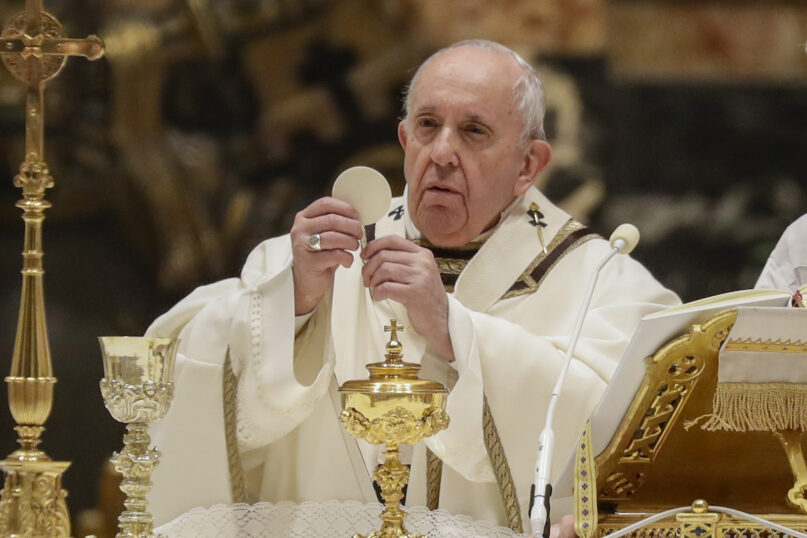(RNS) — So it turns out the Vatican can move fast when it wants to.
Last month, Bishop Peter Kohlgraf of Mainz, Germany, said the Catholic Church should offer blessings for same-sex unions, calling attention to examples of such blessings in a book whose publication he approved.
On Monday, the Vatican’s doctrinal office, the Congregation for the Doctrine of the Faith, said no way.
Blessings are similar to sacraments, and can only be bestowed on licit relations, explained the CDF in an “explanatory note.” Because sex is only permitted within marriage and only then when open to procreation, whatever positive elements might exist within a same-sex union, it is “not ordered to the Creator’s plan.”
End of story?
“There are no easy answers to questions like these,” responded Limburg Bishop Georg Bätzing, head of the German bishops conference, which is conducting wide-ranging discussions on the way power is exercised in the church, sexual morality, the priesthood and the role of women. “The points of view put forward today by the Congregation for the Doctrine of the Faith must and will naturally find their way into these discussions,” Bätzing said.
These days, it’s Roma locuta, causa non finita.
One reason the case on same-sex blessings isn’t closed is that while the CDF, like an ecclesial King Canute, can order the tide of public opinion to halt, it’s lapping well above the CDF’s ankles. In the U.S., as of three years ago, support for same-sex marriage among Catholics had reached 72.6%.
RELATED: Pope Francis shuts down proposals to bless same-sex couples
Of course, it’s nothing out of the ordinary for American Catholics to fail to toe the church’s doctrinal line. But marriage is an area of particular play for what theologian David Tracy calls the analogical imagination — the theological use of language to discern a harmony of meaning “in relation to the whole of reality and in particular in relation to the realities of God, the self, other selves, and the world.”
Thus, a nun is considered to be married to Christ and a bishop to be married to his diocese — and both relationships benefit from blessings.
Yet the CDF’s explanatory note says that same-sex unions are illicit “because they would constitute a certain imitation or analogue of the nuptial blessing invoked on the man and woman united in the sacrament of Matrimony, while in fact ‘there are absolutely no grounds for considering homosexual unions to be in any way similar or even remotely analogous to God’s plan for marriage and family.'”
Not much imagination there.
According to a footnote, that quote at the end comes from Pope Francis’ 2016 apostolic exhortation ”Amoris laetitia,” but in fact “Amoris” quotes it from the final report of the 2015 Synod of Bishops, which in turn quotes it from the CDF’s own 2003 “Considerations Regarding Proposals To Give Legal Recognition to Unions Between Homosexual Persons.”
You will not be surprised to hear that “Considerations” reached the conclusion that “respect for homosexual persons cannot lead in any way to approval of homosexual behavior or to legal recognition of homosexual unions.” Did I mention that Pope Francis — who signed off on the CDF’s latest “point of view” — has for years signaled his own support for civil unions, most recently in a documentary that aired last year?
Rome speaks, and sometimes, after a while, it changes its mind.






